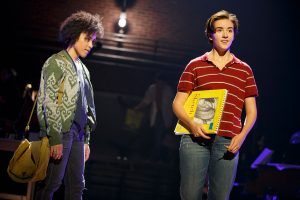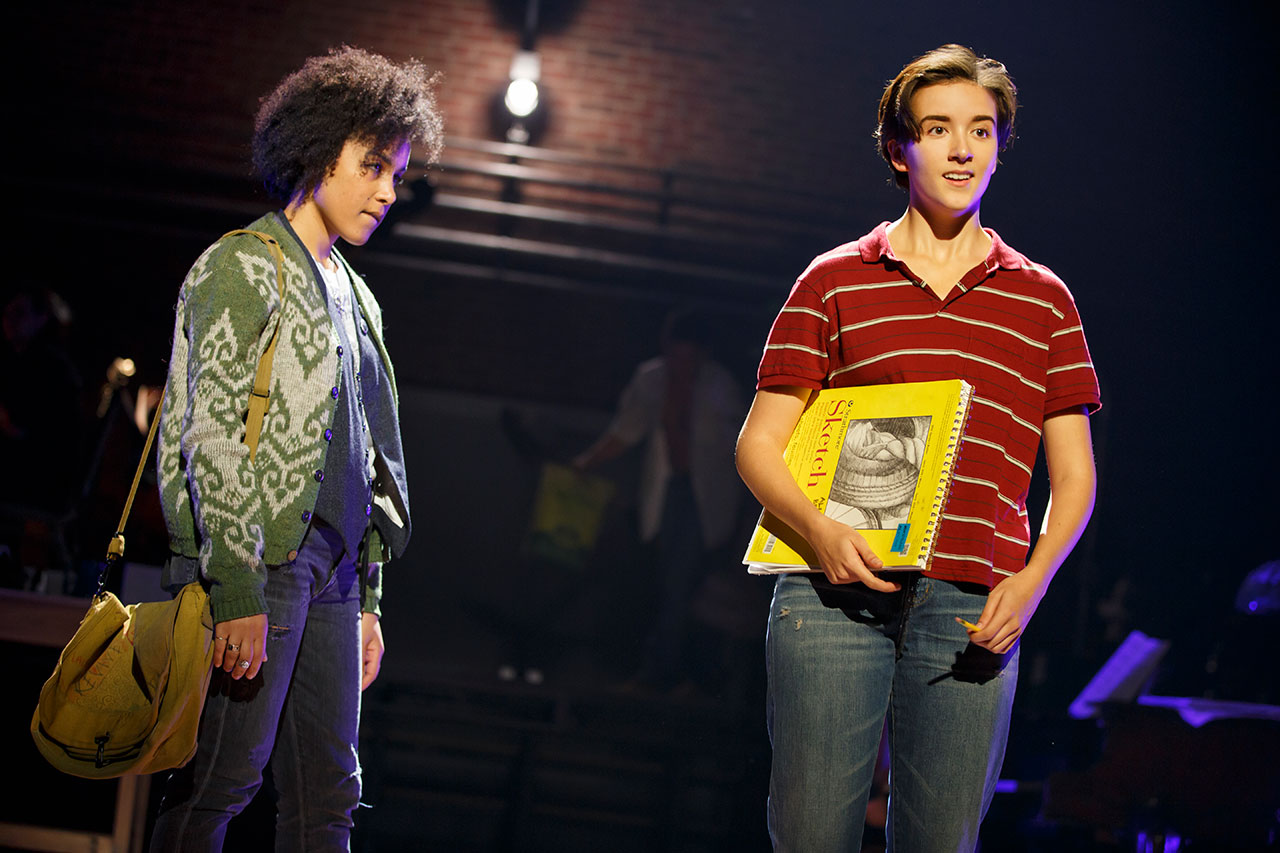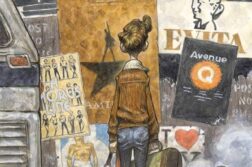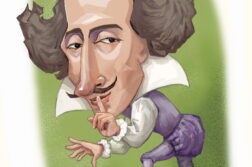 Fun Home
Fun Home
Based on the graphic novel by Alison Bechdel
Directed by Sam Gold
Touring Broadway Company at the Boston Opera House, Oct. 17-29, 2017
IF THEATER IS a temporary rearrangement of life to spark discovery, the musical Fun Home, adapted from cartoonist Alison Bechdel’s bestselling graphic memoir of the same name, exceeds requirements, not only yielding insights but whipping up exuberance out of anguished chaos in the process. As seen in a recent production, the musical demonstrates how translation from visual to acoustic form can amplify and dazzle.
The musical version of Fun Home credibly captures the perplexing atmosphere, searing revelations, and generous spirit of Bechdel’s original work, the story of an emerging lesbian and her closeted gay father as their secrets are disclosed to a wider world, with all the risks implied. Playwright and performer Lisa Kron (Well and the Obie-winning 2.5 Minute Ride) wrote the book and lyrics for the musical. Sam Gold directed the 2015 Broadway production and the company’s national tour, and he will direct Fun Home’s London debut at the Young Vic in June. Fun Home is the first Broadway musical to have an openly lesbian protagonist and the first show written entirely by women to win a Tony Best Musical award.
Composer Jeanine Tesori has written a pitch-perfect score for the musical, with more than two dozen numbers that carry strong emotion. The main characters—Alison Bechdel at three different ages, her mother Susan, and her father Bruce—all sing powerful solos, and even the Bechdel kids’ songs command attention. Kron’s script calls for frequent shifts in sets and lighting as the action shifts backward and forward in time, a device that allows connections to be made between early events and later ones. The show’s circling back is similar to the technique used in the memoir, where earlier stories are reframed in light of new experience. The fast-paced musical is a hot-wired but still cerebral exploration of the human yearning to connect, and of home as the incubator for a creative life.
The underlying story is set in rural Beech Creek, Pennsylvania, in the late 1960s and in 1980, with the Alison of today supplying occasional commentary as a nearly constant onstage observer. Oddly enough, she opens Fun Home by divulging its ending: “[My father] killed himself … and I have become a lesbian cartoonist.” Bruce Bechdel immediately appears onstage, accompanied by his six- or seven-year-old child (“small Alison”). As the pair begins digging through a box of discarded Irish lace curtains, they start rummaging through the family’s past as an entrée to their tightly intertwined lives.
“Medium Alison,” a student at Oberlin College, adds anxious worries about her sexual identity to the mix of volatility and confusion surrounding her father, who has kept his gay self secret while living the life of a high school English teacher, part-time mortician, husband to Helen, and parent of Alison and her two younger brothers. Restoring and decorating the family’s enormous, dilapidated 19th-century house is Bruce’s overriding obsession. After the years-long renovation is finished, having completed court-ordered counseling for plying a minor with alcohol, and as his marriage is coming apart, he commits suicide. Alison’s attempt as an adult to understand how she and her father had been connected, the elusive but real ways that he gave her support, are the main themes of this engrossing tale.

Fun Home avoids simple resolution of complex issues, and the musical feels faithful to the tone and storyline of Bechdel’s 2006 memoir. But memoir and musical are distinct forms. The former relied on its author’s childhood journal and an astonishing cache of saved letters, memorabilia, notes, photos, news clips, and literary quotes to generate drawings and captions. The musical, on the other hand, displays not thoughts or images but behavior: it uses actors to tell the story. So, changes had to be made.
Thus while detailed drawings are largely missing from the show, the musical exploits selected images from the original as metaphors. Small Alison is lofted as an “airplane” on top of her father’s feet, symbolizing his gift of playful, artistic perspective. Alison and her little brothers jump into (and out of) a funeral home display coffin, suggesting their camaraderie (the memoir is dedicated to them and to Bechdel’s mother). Helen’s frequent turns pounding keys on the family piano convey her angry bewilderment.
Another change is that the memoir is filled with literary reflections that prompt digressions and associations. For instance, Alison continually decodes novels her father is reading for clues to his feelings, and her own. The books they parse suggest secrets and taboos: books by Proust, Fitzgerald, Colette. But if literary references suffuse the memoir, the musical scoffs at such high-brow allusions. For example, Alison’s girlfriend Joan dismisses Bruce’s recommendation that she read Colette for guidance as “weird.”
Of course, memoir and musical are fundamentally distinct forms—sketches with captions versus score and lyrics—and the musical requires serious compression of plot. In terms of overall emphasis, however, the difference may be less than you’d think. In both graphic and acoustic versions, for example, the Bechdel siblings are a driving force. This is true in the memoir, where their incredulous expressions shed doubt on Bruce’s honesty, and in the musical, where their voices defy his order to stop playing coffin games and instead belt out spoofy ads for the family business. The biggest showstopper includes these lines: “We got the Kleenex and your choice of Psalm,/ Stop by the Fun Home,/ Think of Bechdel when you need to embalm.”
But there are many captivating numbers, including the family’s wry song of introduction that’s reprised at the end, “Welcome to Our House on Maple Avenue”; Helen’s despairing lament when she realizes her marriage is coming apart, “Days and Days”; the poignant lullaby “Pony Girl” that Bruce sings to Alison before he goes off cruising during a trip to New York; the full company’s fantastic “Raincoat of Love”—which is sung with disco lights streaming across stage back; and collegiate Alison’s declarative solo, after she and Joan make love for the first time, that she is a real lesbian after all: “I’m Changing My Major to Joan!”
After winding up its tour of twenty U.S. cities in 2017, the Fun Home cast is scheduled for engagements in Barcelona, Tokyo, and London in the coming months.
Rosemary Booth is a writer and photographer living in Cambridge, Mass.





